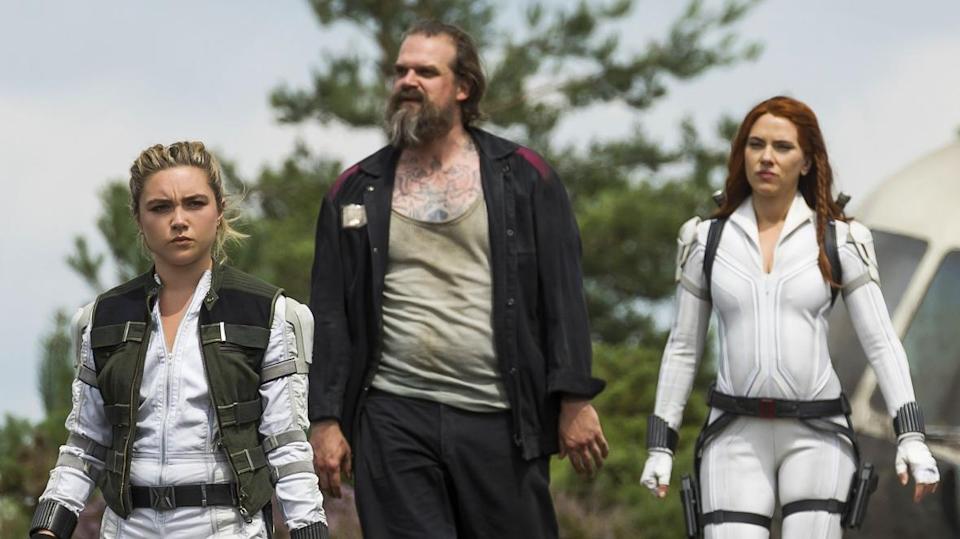 By Jacob Sahms
By Jacob Sahms
In the latest film in the Marvel pantheon, audiences get an intimate look at Scarlett Johansson’s Black Widow, from her childhood through her involvement in the events of Captain America: Civil War. With a title feature film, Black Widow becomes the second female Marvel character to get top billing (after Jennifer Garner’s Elektra), finally arriving onscreen fifteen years after the idea was first discussed. In a year starved for major blockbusters, a ninety-million-dollar opening weekend shows it was worth the wait.
 After a brief flashback to Natasha Romanov’s childhood that sets up the rest of the film, the film drops the audience in the middle of the conflict between the United States’ Secretary of State Ross (William Hurt) and those heroes who refuse to abide by the Sokovia Accords (i.e. mutant registration). Romanove/Widow is on the run, while another Black Widow Yelena Belova (Florence Pugh) kills another Black Widow, before being exposed to the Red Dust. The dust reverses the efforts of Russia’s Red Room mind control on the Widows, allowing Belova to see herself as she really is. Motivated by this, she seeks contact with Romanov for the first time in years, hoping that she’ll help Belova overthrow Dreykov (Ray Winstone), the manipulative director of the Red Room. With Ross on her heels, Romanov finds herself battling the mysterious Taskmaster, hunting for the elusive Room, seeking to keep others from experiencing the same hardships that she and Belova did.
After a brief flashback to Natasha Romanov’s childhood that sets up the rest of the film, the film drops the audience in the middle of the conflict between the United States’ Secretary of State Ross (William Hurt) and those heroes who refuse to abide by the Sokovia Accords (i.e. mutant registration). Romanove/Widow is on the run, while another Black Widow Yelena Belova (Florence Pugh) kills another Black Widow, before being exposed to the Red Dust. The dust reverses the efforts of Russia’s Red Room mind control on the Widows, allowing Belova to see herself as she really is. Motivated by this, she seeks contact with Romanov for the first time in years, hoping that she’ll help Belova overthrow Dreykov (Ray Winstone), the manipulative director of the Red Room. With Ross on her heels, Romanov finds herself battling the mysterious Taskmaster, hunting for the elusive Room, seeking to keep others from experiencing the same hardships that she and Belova did.
Without giving away too much, the resulting collaboration between Romanov and Belova causes a deep dive into family, purpose, and identity. While Romanov went her way years before, Belova’s new open-eyed awareness gives her motivation that isn’t the big-picture world-saving mantra of the Avengers, but rather a desire to find her true self, free others under mind control, and exact a bit of revenge. In this role, Pugh is an absolute scene stealer, much like she was in Little Women, with humor, panache, and more than enough skill to build anticipation for any future Widow films. She’s the moral impetus, and the heartbeat, of the film.
 Belova’s revelation as the result of the Red Dust seems a good bit like Morpheus’ offer to Neo, without a choice. But it’s also akin to the baptism of believers, where Belova is suddenly made aware of her own need for grace, forgiveness, and redemption. She’s liberated, like someone freed from human trafficking, to become a liberator of others, to carry the necessary revelation that these Widows are more than mindless puppets of the Red Room, to become ‘evangelists’ of the good news that the world is bigger and better than these young women though possible.
Belova’s revelation as the result of the Red Dust seems a good bit like Morpheus’ offer to Neo, without a choice. But it’s also akin to the baptism of believers, where Belova is suddenly made aware of her own need for grace, forgiveness, and redemption. She’s liberated, like someone freed from human trafficking, to become a liberator of others, to carry the necessary revelation that these Widows are more than mindless puppets of the Red Room, to become ‘evangelists’ of the good news that the world is bigger and better than these young women though possible.
 Isn’t that each believer’s obligation? Jesus declared that The Mission in Luke 4:18-19, referencing the prophet Isaiah: “The Spirit of the Lord is on me, because he has anointed me to proclaim good news to the poor. He has sent me to proclaim freedom for the prisoners and recovery of sight for the blind, to set the oppressed free, to proclaim the year of the Lord’s favor.” We don’t get “Red Dust”; we get the blood of Jesus shed on the cross and the Resurrection. But we’re called to proclaim the good news, to help blind people see, to free those imprisoned literally, by addiction, by sin, by their own ignorance, by things others have done to them.
Isn’t that each believer’s obligation? Jesus declared that The Mission in Luke 4:18-19, referencing the prophet Isaiah: “The Spirit of the Lord is on me, because he has anointed me to proclaim good news to the poor. He has sent me to proclaim freedom for the prisoners and recovery of sight for the blind, to set the oppressed free, to proclaim the year of the Lord’s favor.” We don’t get “Red Dust”; we get the blood of Jesus shed on the cross and the Resurrection. But we’re called to proclaim the good news, to help blind people see, to free those imprisoned literally, by addiction, by sin, by their own ignorance, by things others have done to them.
Really, we’re all Widows, bought back by someone else’s sacrifice, called to replicate what we’ve experienced. Then we’ll all be free indeed.




